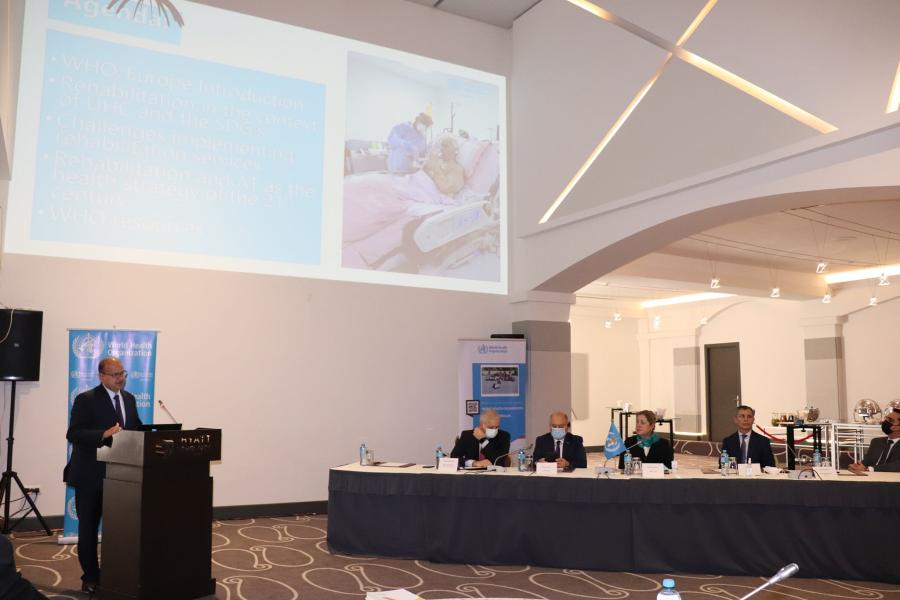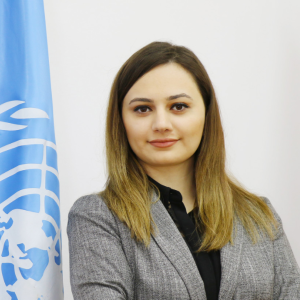WHO’s mission: It is critical to enhance efforts to improve access to assistive technologies
25 November 2021
- The World Health Organization (WHO) Country Office in Azerbaijan conducted the second meeting of key stakeholders on "Strengthening the Assistive Technology (AT) and Rehabilitation Sector in Azerbaijan” in partnership with the Ministry of Labor and Social Protection of the Republic of Azerbaijan.

The purpose of the meeting was to discuss further steps to be taken in this regard. Addressing an opening speech, the WHO Representative in Azerbaijan, Dr. Hande Harmanci said that since the first online meeting conducted on April 2, 2021, significant progress was made with the thorough study of AT needs of the country through a survey and the achievement of goals determined for 2021.
After greeting participants and guests, Deputy Minister of Labor and Social Protection of Population, Hidayat Abdullayev, Deputy Minister of Health, Rahim Aliyev, Chairman of the Social Policy Committee of the Milli Majlis, Musa Guliyev and Chairman of the Human Rights Committee, Zahid Oruj spoke about the importance of the problem. Mr. Satish Mishra, Regional Adviser on Disability, Rehabilitation and Palliative Care of the WHO Regional Office for Europe, and Dr. Cathal Morgan, Disability, Rehabilitation and Health Services Specialist attended the event. Mr. Satish Misra briefed participants on "Rehabilitation and AT in the WHO European Region: Challenges and Opportunities". Thereafter, representatives of the WHO Country Office in Azerbaijan,Mrs. Fidan Talishinskaya and Professor Vugar Mammadov presented results of the “r-ATA” survey (rapid-Assistive Technology Assessment WHO survey tool) that was undertaken in 67 countries by the WHO and conducted in Azerbaijan during 2021 to ascertain the needs of the country. According to 5,597 respondents surveyed in 8 economic regions out of 11 of Azerbaijan, 2 out of 5 persons in the country are experiencing at least some difficulty in one or more of 6 functional domains (mobility, vision, hearing, communication, cognition, self-care). Although one in four people needs AT, but most do not have access to it or can’t afford due to financial difficulties and a lack of support. Furthermore, it is stated that 91% of the assistive products owned by respondents are either paid out of pocket or come thanks to the support of their families and friends. The private sector is the major source of assistive products in the country. In many cases, users have to make a long-distance travel to get AT. The respondents also do not have information about many of existing ATs that are available in the world.
There is a significant lack of awareness and understanding amongst the general population in Azerbaijan as to what an AP is and how APs can be accessed
Findings obtained through the "rATA" study in Azerbaijan were discussed interactively under the moderation of Cathal Morgan in the discussion part of the event when there were important recommendations received regarding the respective field of the country. These mainly covered two directions: 1) to conduct a comprehensive analysis of the current situation of AT supply/provision, including the development of a roadmap for strengthening the intersectoral cooperation; 2) to simplify access to AT, to raise awareness of AT workers, users and the general public on this matter.
It should be noted that representatives of the Ministry of Labor and Social Protection of Population, State Medical-Social Expertise and Rehabilitation Agency, DOST Agency, Ministry of Health, the State Agency on Mandatory Health Insurance, TABIB, Milli Majlis, the State Statistical Committee, the State Committee for Family, Women and Children Affairs, Ombudsman's Office, Social Research Center, Azerbaijan National Academy of Sciences, ADA University, Azerbaijan State Academy of Physical Culture and Sport, Azerbaijan Medical University, Azerbaijan State Advanced Training Institute named after A.Aliyev, embassies, UN agencies, USAID, ICRC and other international and local non-governmental organizations joined the event.
AT, as part of health technology is the application of organized knowledge and skills on assistive products that include systems and services.
Assistive products are any external products (including devices, tools, equipment, instruments of software) which are generally available or especially produced to maintain or improve a person’s functionality and independence in society as well as to promote their well-being. Assistive products also include all rehabilitation means used in the period of disability and have potential to prevent the complications of chronic diseases.


